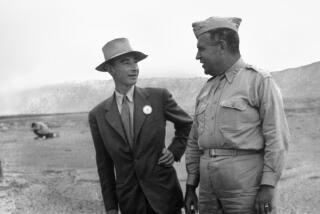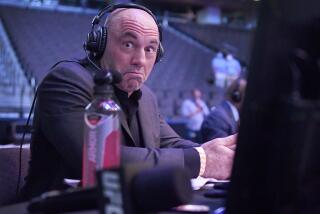Criticizing Inventions Was Not an Incandescent Idea
- Share via
In writing recently about the Invention Convention in Pasadena, I deplored what I regarded as a lack of inventions that would truly make life on Earth better for us or improve our environment.
I did note that the inventions shown included a wind turbine that looked like a daisy, a generator that generated power from ocean waves, an electric car and a solar hot dog machine.
I don’t know what the immediate application of the first two might be, though of course they would produce power without fuel; the electric car has long been on the boards and is long overdue; as for the solar hog dog, it would of course make it possible for us to sizzle our hot dogs without producing pollutants, but the smell of that redolent smoke would be lost.
I do see that these four, if mass produced and made available to the public, might in the long view be beneficial; of course the electric car would clean our skies overnight, but there is a certain kind of man who does not want to give up the growl of an eight-cylinder gasoline-powered beast.
However, excepting two or three esoteric exhibits that I did not understand, I saw none that showed any promise of improving life. There wasn’t anything close to the telephone, or even the vacuum cleaner. I did not feel any excitement.
“Here and there among the crowd,” I wrote, “I saw older men thoughtfully strolling among the exhibits. They looked like college professors emeritus. I suspected that they were inventors, checking the competition.”
(I should have said professors emeriti , as a Latin scholar has pointed out.)
My expression of disappointment in the show brought a scathing retort from John K. Moreland, assistant editor of The Dream Merchant, a monthly publication for inventors, entrepreneurs and small business owners.
“For centuries,” he says, “creative men have been criticized, ridiculed and even persecuted by narrow-minded individuals like yourself. Socrates was imprisoned and eventually died behind bars for teaching a train of thought that differed from Athenian rule. Copernicus was imprisoned and thought to be insane for preaching that the earth was not the center of the universe. Christopher Columbus was believed to be crazy to try to prove the earth was round and not flat. Edison was discredited by many of his fellow colleagues for his attempt to prove his incandescent theory that has given the world light.”
He points out that the show was not for the likes of me. “Sure, you and others like you may have had your doubts about Silly Putty, photocopy machines, Wacky Wall Walkers, home computers, Hula-Hoops, yo-yos and Pet Rocks, all of which made millions.”
I certainly do not scoff at the financial success of Silly Putty, Hula-Hoops, yo-yos and Pet Rocks. They are prime examples of the sort of novelty that will seize the American mind. Perhaps they all got their start at an Invention Convention.
But they do not seem to me to be the sort of thing that would have caught the imagination of Socrates, Copernicus, Columbus and Edison. Besides, even they weren’t so great. Edison is the only one who invented anything you can buy at the Builders Emporium.
“Jack,” Moreland goes on, “that is what the show was all about--innovation and industry. The majority of the exhibitors were there to network with sources that could help them get their produce to the marketplace. Most exhibitors were not interested in Ma and Pa coming down to criticize their inventions. They wanted to attract media and industry attention, both of which existed in abundance at the Invention Convention.”
True, most of the visitors seemed to be inventors, dealers or entrepreneurs of one kind or another.
The inventions that seemed to be doing the biggest business were the better mousetrap (one may decide whether to kill the mouse or not), dark glasses for dogs, a racket with a catch that may be used to pick up tennis balls, an edible golf club (its head is a chocolate chip cookie), a couple of blocks that one places in the toilet tank to save water, a machine that massages one’s mind through headphones, a plastic baby bath and a blouse in which a mother may nurse an infant without exposing herself.
Surely I have no right to knock the show. It’s for inventors and for wheelers and dealers who have the dough and the know-how to turn their gadgets into crazes and big money.
Moreland compared me to Charles H. O’Duell, the 1899 commissioner of patents, who said, “We should close the patent office, for everything that can be invent e d has been invented.”
I am like O’Duell. He couldn’t foresee Silly Putty, the Hula-Hoop and the yo-yo.
I wonder what I’m overlooking.
More to Read
Inside the business of entertainment
The Wide Shot brings you news, analysis and insights on everything from streaming wars to production — and what it all means for the future.
You may occasionally receive promotional content from the Los Angeles Times.










